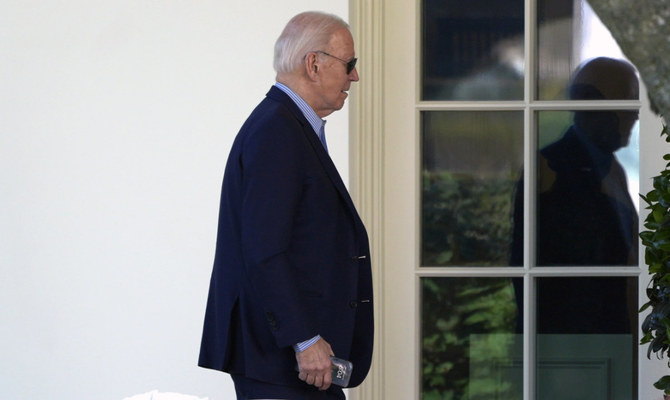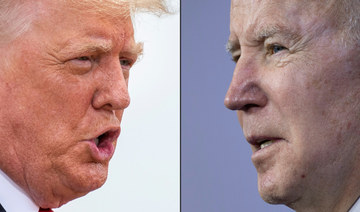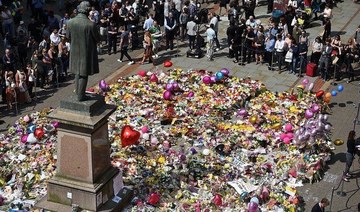WASHINGTON: Iran’s attack on Israel gives Joe Biden a familiar dilemma, but on steroids — how to balance support for a difficult ally while preventing the nightmare scenario of a wider war?
Tensions with Prime Minister Benjamin Netanyahu over Israel’s war on Gaza were papered over as the US president offered “ironclad” support, including shooting down Iranian drones.
But the White House said it would not support an Israeli counterattack and warned Israel to “think carefully” about escalation that could trigger a full-blown regional conflict.
The question then for Biden, who is facing a tough reelection battle against Donald Trump in November, is what if Netanyahu goes ahead anyway, as he has done in Gaza?
“It puts him in a very tough spot” Colin Clarke, Director of Research at the Soufan Group, told AFP.
“I think he’s suspicious of Netanyahu’s motives here... that Netanyahu is attempting to broaden the war throughout the region to deflect from how poorly the war is going for him in Gaza.”
Biden has been trying to avoid a regional war that could suck the United States back into the Middle East ever since Hamas’s October 7 attack and Israel’s offensive on the Gaza Strip.
The 81-year-old has, however, struggled to use the leverage provided by the United States being Israel’s main military supplier, especially given a long history of tense relations with Netanyahu.
Biden has been increasingly critical of the death toll in the Palestinian territory and even went as far as suggesting the US could limit military aid, but so far to little effect.
Iran’s attack has seen Biden go back to showing overt support — but at the same time scrambling to stop the crisis spiraling.
White House National Security Council spokesman John Kirby said Netanyahu was “well aware” that Biden did not want a “wider war.”
Biden himself warned Netanyahu of the potential dangers in a call on Saturday night at a time of “heightened emotion.”
“The president had a discussion about trying to slow things down, think through things,” a US official said.
The hope was that “in the light of day” Israel would see it had had a “spectacular success” against Iran’s attack, added the official.
Washington’s calculus looks to be that Iran also got what it wanted, with a show of force in retaliation for Israel’s strike in Damascus earlier this month that killed a key Iranian general, but with minimal damage.
“However, I fear the status quo will be short-lived,” said James Ryan, Executive Director of the Middle East Research and Information Project, warning of a “dangerous spiral.”
“I expect Biden to attempt to restrain Israeli responses, but Netanyahu has already shown a willingness to test any kind of limit Biden wishes to impose,” he added.
“It’s all very cynical now, unfortunately.”
Biden’s options for restraining Israel are likely to be limited at this stage to tough language in private and making threats in public.
“They’ve got themselves into a corner in many ways,” said Clarke.
“I think they’ve overplayed their hand a little bit by saying the administration is considering cutting off weapons to the Israelis. It’s never going to happen — I think it’s an empty threat, especially in an election year.”
The US presidential election in November comes as Biden faces domestic political pressure on all sides when it comes to Israel.
Trump has led a chorus of Republicans accusing Biden of being weak on the issue — while young and left-wing voters in particular are angered by his failure to stop the bloodshed in Gaza.
Netanyahu, facing his own political and legal issues at home, would now be able to use the Iran attacks to “paper over the very real rifts that exist” with Washington on Gaza, said Clarke.
“If he can drag this out until November, he’s hoping for a Trump victory” when he would have “carte blanche” to act however he wanted in the region, said Clarke.
Another possibility, however, is that Netanyahu may decide to “accede to American urgings” for now on Iran — but with a cost, said Paul Salem, President and CEO of the Middle East Institute.
“Politically, I think they can cash in on saying, ‘okay, America, we won’t do anything, we’re being good. But in exchange, you have to, you know, give us more of a free hand in Gaza,’” he said.
Biden in ‘very tough spot’ trying to stop Middle East escalation
https://arab.news/2yf4n
Biden in ‘very tough spot’ trying to stop Middle East escalation

- Biden has been trying to avoid a regional war that could suck the United States back into the Middle East ever since Hamas’s October 7 attack
Civilians evacuated from northeast Ukraine as Russia steps up assault

- Heavy fighting raged on Sunday as Russia attacks 27 settlements
KYIV: Thousands more civilians have fled Russia’s renewed ground offensive in Ukraine’s northeast that has targeted towns and villages with a barrage of artillery and mortar fire, officials said Sunday.
The intense battles have forced at least one Ukrainian unit to withdraw in the Kharkiv region, capitulating more land to Russian forces across less defended settlements in the so-called contested “gray zone” along the Russian border.
Meanwhile, a 10-story apartment block collapsed in the Russian city of Belgorod, near the border, with several deaths and injuries reported. Russian authorities said the building collapsed following Ukrainian shelling. Ukraine has not commented on the incident.
HIGHLIGHT
The Russian Defense Ministry said Saturday that Moscow’s forces had captured five villages on the border of Ukraine’s Kharkiv region and Russia. Ukraine’s leadership has not confirmed Moscow’s gains.
At least 4,000 civilians have fled the Kharkiv region since Friday, when Moscow’s forces launched the operation, Gov. Oleh Syniehubov said in a social media statement. Heavy fighting raged Sunday along the northeast front line, where Russian forces attacked 27 settlements in the past 24 hours, he said.
Analysts say the Russian push is designed to exploit ammunition shortages before promised Western supplies can reach the front line. Ukrainian soldiers said the Kremlin is using the usual Russian tactic by launching a disproportionate amount of fire and infantry assaults to exhaust their troops and firepower.
It comes after Russia stepped up attacks in March targeting energy infrastructure and settlements, which analysts predicted were a concerted effort by Moscow to shape conditions for an offensive.
Ukrainian President Volodymyr Zelenskyy said that disrupting Russia’s offensive in the area was a priority, and that Kyiv’s troops were continuing counteroffensive operations in seven villages around the Kharkiv region.
“Disrupting the Russian offensive intentions is our number one task now. Whether we succeed in that task depends on every soldier, every sergeant, every officer,” Zelenskyy said.
The Russian Defense Ministry said Saturday that Moscow’s forces had captured five villages on the border of Ukraine’s Kharkiv region and Russia. These areas were likely poorly fortified due to the dynamic fighting and constant heavy shelling, easing a Russian advance.
Ukraine’s leadership has not confirmed Moscow’s gains.
Black, Asian and minority ethnic people make up nearly 70% of UK’s anti-terror detentions, data shows

- Fewer than 1 in 5 who were stopped were recorded as white
LONDON: Nearly 70 percent of people stopped at UK ports under anti-terrorism laws since 2021 were from Black, Asian and minority ethnic backgrounds, new figures released on Sunday show.
The Guardian newspaper requested police data under freedom of information laws, which also revealed fewer than one in five who were stopped were recorded as white.
Campaigners have criticized the statistics, saying they prove the UK’s anti-terrorism laws are disproportionately affecting Black and minority ethnic groups and not being used effectively enough to arrest the rise of far-right, white extremism, The Guardian reported.
Of the 8,095 people stopped at UK ports since 2021 under Schedule 7 of the Terrorism Act 2000, 5,619 (69.4 percent) were recorded as being from Black, Asian and minority ethnic backgrounds, compared with 1,585 (19.6 percent) recorded as white British, white Irish or white other stopped under the same law.
The head of public advocacy at the anti-Islamophobia group Cage International has also pressed British police to publish data on the religious background of those stopped under the Terrorism Act.
Anas Mustapha said: “This new data reaffirms what we already know about its racist and Islamophobic impact. However, despite evidence demonstrating that the majority of those stopped are Muslim and that forces record data on religion, the government has resisted calls to produce a religious breakdown of those harassed at the borders.
“Schedule 7 is one of the most intrusive and discriminatory of all police powers. We’ve supported hundreds of British holidaymakers impacted by the policy and it’s clear that the power is abused and must be repealed.”
A spokesman from the UK’s counter-terrorism police said the law was a “vital tool” in collecting evidence to support convictions of terrorists, as well as helping with intelligence-gathering in the prevention of attacks on British streets.
“The use of Schedule 7 powers regularly features in some of our most complex and high-risk investigations and prosecutions,” the spokesman said.
“We face an enduring terrorist threat from overseas, and whilst we are seeing a much greater prevalence of online activity, travel remains an element of terrorist methodology that provides us with potentially crucial opportunities to act.
“Where the powers are used, there are a range of robust safeguards and measures in place to ensure appropriate usage.”
OIC calls for immediate aid amid Afghan flood crisis

- Flash floods from seasonal rains in Baghlan province in northern Afghanistan
RIYADH: The Organization of Islamic Cooperation has issued an urgent appeal to its member states as well as relief organizations to provide aid to the Afghan people amid catastrophic flooding which has hit the country, Saudi Press Agency reported on Sunday.
Flash floods from seasonal rains in Baghlan province in northern Afghanistan killed at least 315 people since striking on Friday, a UN report said.
Rains also caused heavy damage in northeastern Badakhshan province and central Ghor province, officials said.
Since mid-April, floods have left about 100 people dead in 10 of Afghanistan’s provinces, with no region entirely spared, according to authorities.
Farmland has been swamped in a country where 80 percent of the more than 40 million people depend on agriculture to survive.
UK investigating Hamas’ claim that British hostage killed in Gaza

- Foreign secretary confirms viewing video
LONDON: The UK’s Foreign Office said on Sunday it was investigating a claim by Hamas that a British-Israeli hostage in Gaza had died from injuries sustained in an Israeli airstrike over a month ago.
Nadav Popplewell, 51, was captured along with his mother Channah Peri on Oct. 7 during a border incursion when the Palestinian group launched a surprise attack on Israel.
The Foreign Office said it was actively seeking more information on the matter.
Popplewell’s family has requested media outlets refrain from airing footage released by Hamas, showing him in captivity with visible injuries, the BBC reported.
The UK’s Foreign Secretary David Cameron, speaking to the BBC’s Laura Kuenssberg, confirmed viewing the video but provided no further updates on the investigation.
Cameron said: “We don’t want to say anything until we have better information.”
He described Hamas as “callous” for releasing the video and playing “with the family’s emotions in that way.”
The Foreign Office added that the department’s thoughts “are with his family at this extremely distressing time.”
The Israeli military has not issued a statement on the matter.
Israel’s military campaign in Gaza to destroy Hamas has killed over 34,900 people, the majority of whom are women and children, according to the Gaza Health Ministry.
Israel has reported that 128 hostages are unaccounted for.
UK mountaineer logs most Everest climbs by a foreigner, Nepali makes 29th ascent

- Both climbers used Southeast Ridge route to summit
- They were on separate expeditions guiding their clients
KATMANDU: A British climber and a Nepali guide have broken their own records for most climbs of Mount Everest, the world’s highest mountain, hiking officials said on Sunday.
Rakesh Gurung, director of Nepal’s Department of Tourism, said Britain’s Kenton Cool, 50, and Nepali guide Kami Rita Sherpa, 54, climbed the 8,849-meter (29,032 foot) peak for the 18th and 29th time, respectively.
They were on separate expeditions guiding their clients.
“He just keeps going and going... amazing guy!” Garrett Madison of the US-based expedition organizing company Madison Mountaineering said of the Nepali climber. Madison had teamed up with Kami Rita to climb the summits of Everest, Lhotse, and K2 in 2014.
K2, located in Pakistan, is the world’s second-highest mountain and Lhotse in Nepal is the fourth-tallest.
Lukas Furtenbach of the Austrian expedition operator Furtenbach Adventures called Cool’s feat remarkable.
“He is a fundamental part of the Everest guiding industry. Kenton Cool is an institution,” Furtenbach, who is leading an expedition from the Chinese side of Everest, told Reuters.
Both climbers used the Southeast Ridge route to the summit.
Pioneered by the first summiteers, New Zealander Sir Edmund Hillary and Sherpa Tenzing Norgay in 1953, the route remains the most popular path to the Everest summit.
Kami Rita first climbed Everest in 1994 and has done so almost every year since, except for three years when authorities closed the mountain for various reasons.
He climbed the mountain twice last year.
Mountain climbing is a major tourism activity and a source of income as well as employment for Nepal, home to eight of the world’s 14 tallest peaks, including Everest.
Nepal has issued 414 permits, each costing $11,000 to climbers for the climbing season that ends this month.
















